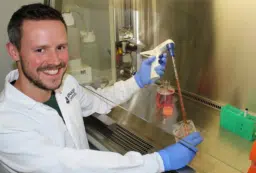We may soon know how much time is left on a genetically female individual’s biological clock, thanks to a Melbourne scientist’s discovery of an egg-produced protein that affects fertility.
Dr Sara Al-Musawi, of Prince Henry’s Institute, found that a protein produced by the ovary’s eggs, BMP15, plays a key role in determining the number of ripened eggs released from the ovary at a time.
“This is really exciting because we have identified the parts of BMP15 or ‘building blocks’ that change how much protein is made and how it performs in the egg, essential for egg growth and ovulation. We believe that treatments targeting this protein could revolutionise how we treat infertility in women,” says Sara, whose research has been published in the Journal of Endocrinology.
She says women are often told that their biological clock is ticking but that no one really knows what that means.
“Unfortunately, most women only really understand the biology of pregnancy after experiencing fertility issues. It is only when they have trouble falling pregnant or they are faced with infertility due to cancer treatment or early menopause that it comes into focus,” Sara says.
Women are born with a lifetime’s supply of eggs. Each month, the ovary releases “ovulates”, the biggest of the ripe eggs, for fertilisation. The more eggs a woman has, the greater the chance of her successfully becoming pregnant.






 Fresh Science is on hold for 2022. We will be back in 2023.
Fresh Science is on hold for 2022. We will be back in 2023.